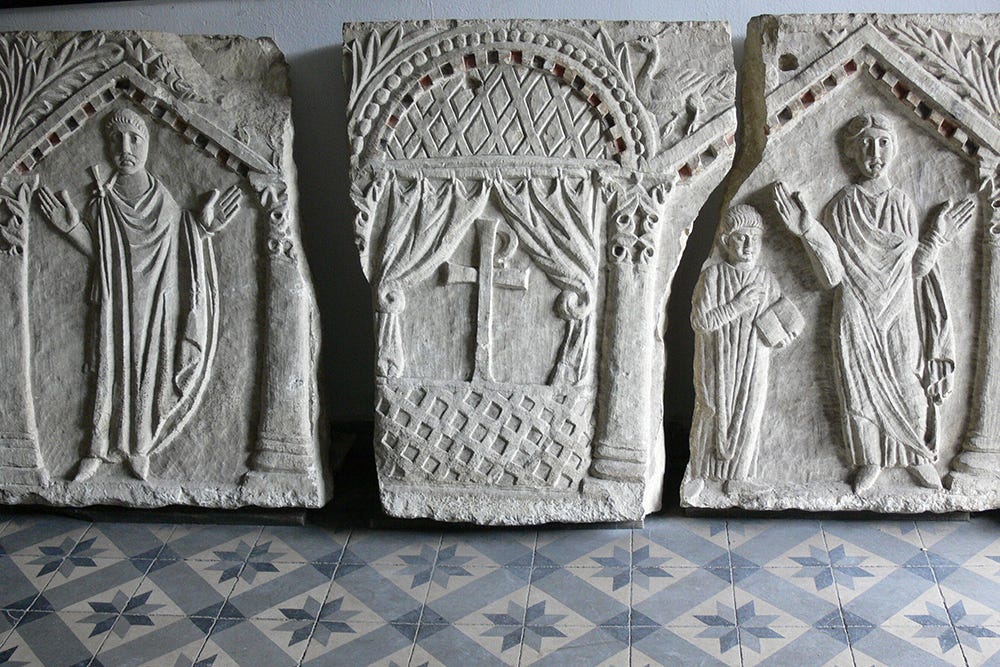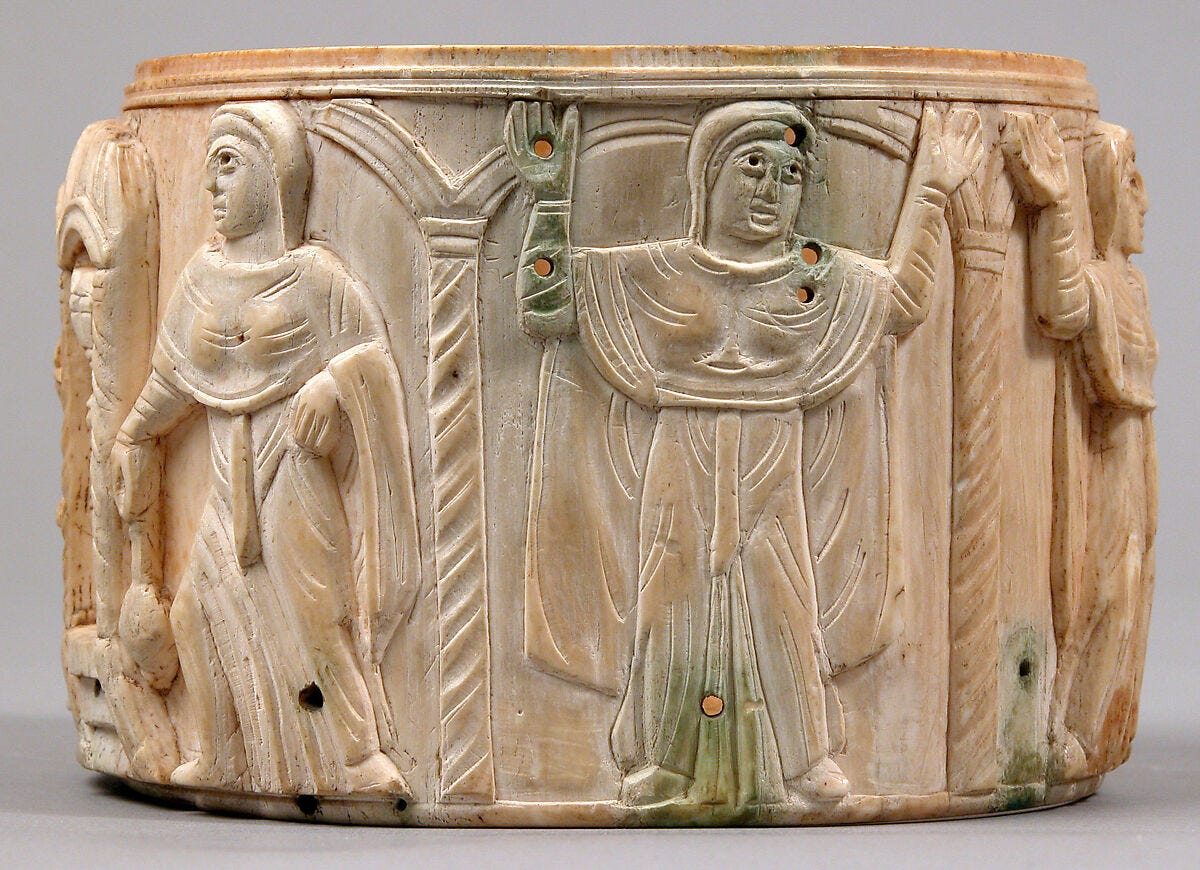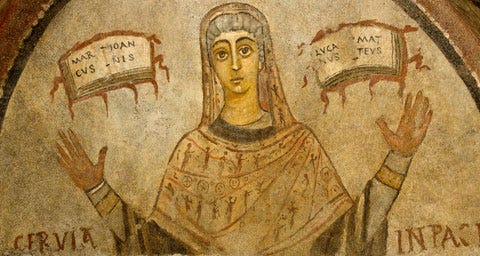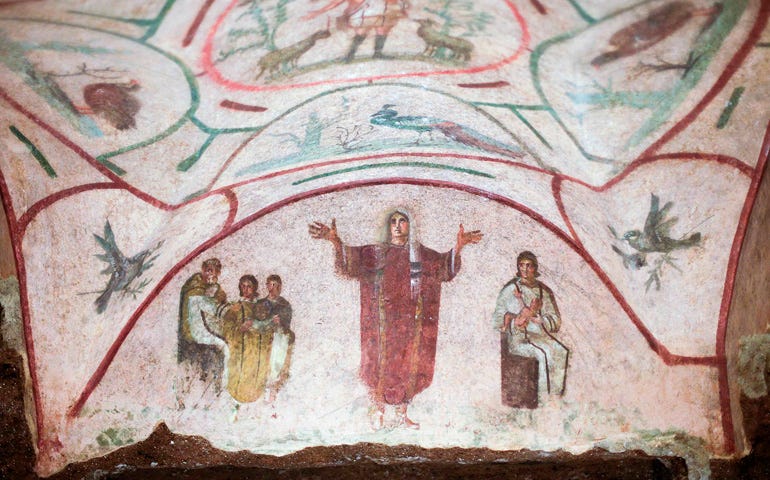A kerfuffle on Anglican twitter this weekend raised familiar talking points about women’s ordination and has me again thinking about the way modern churches fight about women. Apart from a few blissfully unaware years in my Foursquare Church’s youth group, I’ve spent my adult life navigating conversations where a devout Christian woman’s self and sense of calling from God are an “issue.”

Any woman who loves the Lord and respects Scripture knows the arguments about what “the Bible says” women can and cannot do. We’ve studied those verses from all sides. I love thorough exegetical study. Diagramming sentences in Koine Greek brings me genuine delight. However, most of Scripture comes to us as narrative, as stories rather than diagrammable propositions. So we must also consider what women were actually doing in the early church as described in the narrative portions.
Let’s take a sweeping look at what women were doing in the early church. Having been entrusted with the Gospel post-resurrection (make no mistake Jesus goes out of his way to do this), women are preaching about Jesus.
Luke, gospeler to Gentiles and outsiders, also wants us to know that from the earliest days Mary and the other women are with the twelve, praying and with one mind with Jesus' brothers and the apostles.
We discover women at work all throughout Acts.
Timothy's mother is noteworthy, as is Damaris, who heard Paul speak at the Areopagus and is worthy enough to be noted. Deacon Philip and his four prophet-daughters host Paul & co. for many days.
Tabitha, a named disciple, is busy working and well known in her community for good deeds and charity, which encapsulates a great deal of the primary work of the early church.
Christian women experience same consequences of faith as the men. They are persecuted and imprisoned. Saul goes after men *and women*, indicating that women, too, were spreading the message.
Sapphira comes into the apostles' presence expecting to be treated the same as her husband; she is.
So too does Peter, when explaining what is happening on Pentecost, remind his listeners of Joel's prophetic words that sons and daughters will prophesy.
We see this again and again when the Holy Spirit falls on whole households without distinction, empowering everyone for ministry. The descriptions of various giftings in the epistles confirm this. They are not catalogued according to gender; rather every member of the body is equipped for ministry.
We have many such women commended for us in Paul's epistle to the Romans—colaborers and partners in Gospel ministry right alongside the men.
Phoebe, a deacon in Cenchrea, holds the same office as the seven deacons in Acts 6 and is commended as one to be welcomed and supported in ministry.
Mary worked hard for the church.
Junia, a well known apostle believed in Christ before Paul and was also imprisoned for her faith.
Tryphena and Tryphosa were "laborers" in the Lord.
Beloved Persis, *worked hard* in the Lord.
Rufus' mother mothered Paul.
Julia and Olympas, are noteworthy enough to name.
"But!"
I can hear the objections now. "This just means these women worked in the church. It doesn't mean they led in the church."
Okay, so what did leadership look like in the early days of the church?
Set aside our contemporary ideas of a male pastor preaching a sermon and meeting with elder boards and women teaching Sunday school and hosting Bible studies.
There was no such thing.
The work of the church was their love and good deeds and the proclamation of Jesus. All the things we see women doing alongside the men (and without any sort of critique).
We see this most clearly with Priscilla and Aquila. They not only host Paul but together correct Apollos' preaching and are entrusted with the work in Ephesus. They also are identified as having *the church meet in their house.* I don't think we give enough consideration to why this detail of location is mentioned throughout the New Testament.
The early church was a house-church model. There was no building or staff. There was a house. And there were hosts as identifiable leaders.
The apostles appear to have practiced the same pattern that Jesus modeled when He sent out His disciples. They traveled to a place, ministered and taught and stayed in a home that welcomed them, and moved on. Sometimes they stayed a long time, sometimes briefly.
Imagine with me what that would have been like. I’m picturing the way that a Rabbi's closest disciples would have gathered around after the crowds dispersed, the way we see the twelve often do with Jesus. I wonder if the earliest missionaries’ hosts would draw near for one-on-one conversation, for mentoring. I wonder if they became the natural geographical leaders once a missionary moved on.
I don't think Luke is giving us incidental details when he names where house churches met.
Mary, John Mark's mother, houses the gathered church in Jerusalem.
Lydia also has the church in Philippi meeting in her house.
So does Nympha in Laodecia.
Chloe's household is notable in Corinth.
A case can be made that 2 John is likewise written to a woman leading a church. Without question, Scripture names these women as identifiable people connected to the nascent church in those communities. This is worthy of further exploration.
Are these women mentioned because they served a meal and made up guest rooms? Or because men didn't host? No. Men are named as hosts elsewhere.
I think they were the church leaders in those communities.
Consider: Lydia not only is the first convert in Europe, but she is given the same distinction as Cornelius that she and her household were baptized. She later hosts Paul & co. and the church in Philippi in her home, peopled at first almost entirely by women. I find it so fascinating that when Paul has a vision of a man begging him to come to Macedonia, he travels there and instead finds an assembly of “women who had gathered” in the place of prayer by the river.
When Paul later writes the church in Philippi, he commends them for their "participation in the gospel from the first day until now." What was the first day? Could it be when he first preached to a small group of women by the river? Because they've been colaboring since then. Paul knows them by name, Euodia and Syntyche who with the men have “struggled together in gospel ministry along with me and Clement and my other coworkers.”
Over and over we see men and women together sprinkled throughout the narrative as identifiable church leaders in their communities. The story shows us what early church did. Women were not restricted. Neither were Gentiles.
At first, the early church wasn't so sure about the Gentiles.
The Gentile's inclusion goes against everything they have known, but Peter explains what happened: "If God gave them the same gift as he also gave us after believing in the Lord Jesus Christ, who was I to hinder God?"
The mark of the Holy Spirit's empowering is enough for the early church leaders. When this later comes up again at the Jerusalem Council, they listen to how the Holy Spirit has worked among the Gentiles.
They consider the Scriptures.
They discuss together.
And they don't offer a lot of prohibitions:
”For it seemed best to the Holy Spirit and to us not to place any greater burden on you than these necessary rules: that you abstain from meat that has been sacrificed to idols and from blood and from what has been strangled and from sexual immorality.”
It's an argument from silence, I know, but certainly this would be an opportune moment to address who could or could not be in charge. After all, this is the letter that will be passed around to new churches as authoritative apostolic guidance to be used in every church. There is not a single thing about leadership: who gets to do it or who doesn't.

If you've ever been in a tiny church plant, you can likely identify the reason why. Because when it's small, everyone's at work.
All hands on deck.
There's no power or privilege in various roles.
The distinctions come later, as the institutional church develops.
It makes sense to me that the cultural norms of each era would shape the roles much more than the discomforting freedom and Spirit-led out-of-our-control activity of the early church.
As the church grows, the men take charge.
I think this is also why the Pentecostal tradition and holiness movement have consistently accepted women in church leadership as normative. Simply put, they still utilize the metric of the Jerusalem Council: is the Spirit moving? Similarly I think we see corners of the persecuted church welcome women leaders without question. Men and women alike suffer, are imprisoned and martyred, and others step in to fill gaps. Perhaps churches undergoing persecution ask different questions altogether.
I lay all this out here not to dismiss the reasons of conscience that lead to people concluding pastoral offices are only for men. I personally value being in a church tradition that makes space for both views and requires charity from all.
Because there are propositional verses in the epistles that seem to contradict what was happening in the narrative accounts of the early church.
But those propositions don't erase the narrative.

We all have to sort out a way to come to terms with this, but let's not mislead ourselves that doing so is solely a question of biblical authority. As an Anglican, I find it especially curious when arguments I’ve heard in other Protestant spaces about Creation Order or complementarian marriages are used to prohibit women from Holy Orders, as though Anglican Holy Orders are somehow described (let alone prescribed!) on the pages of Scripture.
Whatever the denomination, our contemporary understanding of pastoral roles wasn’t functionally operative in the early church.
When we act as though it was, we give our preferred church traditions and interpretations of them authority over Scripture.
It's an unusual take for most Protestant churches and, in my opinion, a luxury the church has never had.
We will not come to unity and maturity if we assume that our opinions on church organization means the Spirit can't gift a woman as an apostle, prophet, evangelist, pastor, or teacher (Eph 4:11-13).
We can and must organize the church in some way, and I suppose we are free to do it on gendered lines, but this goes against the heartbeat of the Gospel that echoes throughout the epistles, which is the unity and belonging we have in Christ.
I spent many years operating as though handful of controversial propositional verses regarding women were conclusive
I've since come to appreciate the reverse. In my opinion, the overwhelming witness of the New Testament indicates the burden of proof lies with those who want to make those verses the final word on women.
It's not me you need to take it up with.
Take it up with Luke and Paul,
with James and the Jerusalem Council,
with the Spirit who gifts women,
with Jesus Himself who from the beginning told the women: “Go and tell my brothers."









I was too many years old when I realized that our contemporary understanding of pastoral roles wasn’t functionally operative in early church. That really does change the whole conversation. Or at least it should. Unfortunately, for all the talk of a commitment to a historical-grammatical hermeneutic among my hard-core complementarian friends, there’s very little regard for the “historical” part.
Have you read Dr. Timothy Patitsas? You might enjoy his take on this whole subject. From his popular book, The Ethics of Beauty:
"The vision I saw was basically this: men and women alike are called to the same three offices: that of priest (to offer sacrifice), that of king (to lead and to fight), and that of prophet (to bring forth a word of insight). What differs between the genders is that the primary calling among these three offices for women is the prophetic office, while for men, it is the kingly office.
"What unites men and women, though, is that they are called to fulfill their primary offices in a priestly way -- that is, in a self-sacrificial way. They are charged to inscribe the cross of Christ within their primary gender offices, within their respective gender callings. Their first task is not, in a sense, to fulfill their gender calling, but -- a challenging paradox -- to 'crucify' that particular calling.
"When they do so, three things happen. First, their primary office (prophecy for women, kingship for men) seems to be all but wiped out as they become chiefly priests; in other words, their gender office dies, is humiliated, as it is offered sacrificially to God and to each other. Second, their gender office is re-born in a transfigured and much higher form.
"But the third point is the biggest surprise in what I understood, and is the reason why what I saw seemed so beautiful that I was filled with wonder. The real way that Christian gender is inverted from the world's is that in Christ each gender not only dies and is reborn, but in being reborn comes to a dynamic rest as the truest symbol not of its own life but of its partner's role and life. Men come to symbolize best the feminine prophetic office, while women come to symbolize best the masculine kingly office. Thus both men and women experience all three offices, but according to a Pattern or Way that is unique to each. This is how the genders are deeply reconciled in Orthodox life, in a loving act of mutual indwelling and self-offering."